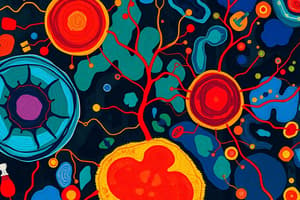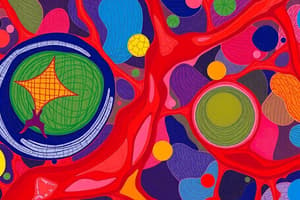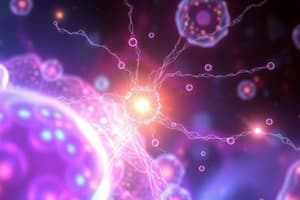Podcast
Questions and Answers
Why do cells need to communicate?
Why do cells need to communicate?
- To integrate functions (correct)
- To synchronise events (correct)
- Adapt to their environment (correct)
- Turn pathways on and off (correct)
What is the disease associated with the degeneration of the myelin sheath called?
What is the disease associated with the degeneration of the myelin sheath called?
- Multiple Sclerosis (correct)
- Alzheimer's Disease
- Parkinson's Disease
- Amyotrophic Lateral Sclerosis
What is Myasthenia Gravis?
What is Myasthenia Gravis?
- An autoimmune disease that affects muscle communication (correct)
- A type of bacterial infection
- A genetic disorder that causes bone deformities
- A mental health condition characterized by severe anxiety
What is slow communication within cells called?
What is slow communication within cells called?
What is slow communication between cells mediated by?
What is slow communication between cells mediated by?
What mediates fast transmission between cells?
What mediates fast transmission between cells?
What is fast communication within cells mediated by?
What is fast communication within cells mediated by?
What are the features of hormonal signaling? (Select all that apply)
What are the features of hormonal signaling? (Select all that apply)
What is electrical signaling?
What is electrical signaling?
What are features of electrical signaling in excitable cells? (Select all that apply)
What are features of electrical signaling in excitable cells? (Select all that apply)
Where does electrical signaling occur in the body?
Where does electrical signaling occur in the body?
What is the resting membrane potential of a typical neuron?
What is the resting membrane potential of a typical neuron?
Why is there a resting membrane potential in cells?
Why is there a resting membrane potential in cells?
Which ions contribute significantly to resting membrane potential?
Which ions contribute significantly to resting membrane potential?
How do ions move across the resting membrane potential?
How do ions move across the resting membrane potential?
Why is the cell relatively impermeable to Na+?
Why is the cell relatively impermeable to Na+?
What pump transports Na+ and K+ in and out of the cell?
What pump transports Na+ and K+ in and out of the cell?
What does the sodium-potassium pump require to function?
What does the sodium-potassium pump require to function?
How many potassium ions are exchanged for sodium ions in the sodium-potassium pump?
How many potassium ions are exchanged for sodium ions in the sodium-potassium pump?
What allows K+ to leak out of the cell?
What allows K+ to leak out of the cell?
What is a chemical gradient?
What is a chemical gradient?
What is the electrical gradient?
What is the electrical gradient?
Why is there a higher concentration of Na+ ions outside the cell?
Why is there a higher concentration of Na+ ions outside the cell?
Why does K+ (potassium ion) want to move down its chemical gradient?
Why does K+ (potassium ion) want to move down its chemical gradient?
What is the equilibrium potential?
What is the equilibrium potential?
What equation determines the equilibrium potential of an ion?
What equation determines the equilibrium potential of an ion?
What is the equilibrium potential for potassium (K+) in millivolts (mV)?
What is the equilibrium potential for potassium (K+) in millivolts (mV)?
What is the equilibrium potential for sodium (Na+)?
What is the equilibrium potential for sodium (Na+)?
What is the equilibrium potential for chloride ions (Cl⁻)?
What is the equilibrium potential for chloride ions (Cl⁻)?
What equation is used to calculate the resting membrane potential while taking into account the permeability of the membrane?
What equation is used to calculate the resting membrane potential while taking into account the permeability of the membrane?
What is an action potential?
What is an action potential?
What do ions cross the membrane through?
What do ions cross the membrane through?
At what threshold do sodium channels typically open during depolarization?
At what threshold do sodium channels typically open during depolarization?
What occurs when sodium enters a cell?
What occurs when sodium enters a cell?
What occurs during repolarization in a neuron?
What occurs during repolarization in a neuron?
What is hyperpolarization the result of?
What is hyperpolarization the result of?
Why does hyperpolarization occur in relation to potassium channels?
Why does hyperpolarization occur in relation to potassium channels?
What is the absolute refractory period?
What is the absolute refractory period?
What is a relative refractory period?
What is a relative refractory period?
What is neurotransmission?
What is neurotransmission?
What is an excitatory postsynaptic potential?
What is an excitatory postsynaptic potential?
At what membrane potential do voltage-gated sodium channels (VGScs) typically open?
At what membrane potential do voltage-gated sodium channels (VGScs) typically open?
Where do action potentials start in a neuron?
Where do action potentials start in a neuron?
How does action potential move along the neuron?
How does action potential move along the neuron?
What does the speed of movement of action potentials depend on?
What does the speed of movement of action potentials depend on?
What is the velocity of action potentials in neurons?
What is the velocity of action potentials in neurons?
Why is myelination important for nerve function?
Why is myelination important for nerve function?
What are the nodes of Ranvier?
What are the nodes of Ranvier?
What is the function of the Nodes of Ranvier in a neuron?
What is the function of the Nodes of Ranvier in a neuron?
Which of the following options are types of neurotransmitters? (Select all that apply)
Which of the following options are types of neurotransmitters? (Select all that apply)
Where are neurotransmitters synthesized?
Where are neurotransmitters synthesized?
Where are neurotransmitters stored?
Where are neurotransmitters stored?
Why are neurotransmitters stored in synaptic vesicles?
Why are neurotransmitters stored in synaptic vesicles?
How are neurotransmitters released?
How are neurotransmitters released?
What are SNARE proteins?
What are SNARE proteins?
How are neurotransmitters removed from the synaptic cleft?
How are neurotransmitters removed from the synaptic cleft?
What are the two classes of neurotransmitter receptors?
What are the two classes of neurotransmitter receptors?
What is an ionotropic receptor?
What is an ionotropic receptor?
What is a metabotropic receptor?
What is a metabotropic receptor?
Which signaling type is slower, ionotropic or metabotropic?
Which signaling type is slower, ionotropic or metabotropic?
How does the binding of a neurotransmitter to a metabotropic receptor lead to an action potential?
How does the binding of a neurotransmitter to a metabotropic receptor lead to an action potential?
What type of receptor is GABAa?
What type of receptor is GABAa?
What type of receptor is GABAB?
What type of receptor is GABAB?
What type of receptor does noradrenaline bind to?
What type of receptor does noradrenaline bind to?
What is the primary function of selective serotonin reuptake inhibitors (SSRIs)?
What is the primary function of selective serotonin reuptake inhibitors (SSRIs)?
What do monoamine oxidase inhibitors do?
What do monoamine oxidase inhibitors do?
What effects do amphetamines and ecstasy have on neurotransmission?
What effects do amphetamines and ecstasy have on neurotransmission?
Which of the following drugs cause non-impulse dependent release of dopamine?
Which of the following drugs cause non-impulse dependent release of dopamine?
What causes the after hyperpolarization (AHP) during an action potential?
What causes the after hyperpolarization (AHP) during an action potential?
What is a primary characteristic of the absolute refractory period?
What is a primary characteristic of the absolute refractory period?
What primarily initiates an action potential in a neuron?
What primarily initiates an action potential in a neuron?
During which phase of the action potential does the membrane potential rise towards +30 mV?
During which phase of the action potential does the membrane potential rise towards +30 mV?
What is the effect of K+ moving out of the cell during the action potential?
What is the effect of K+ moving out of the cell during the action potential?
What results from the slow closing of voltage-gated K+ channels after an action potential?
What results from the slow closing of voltage-gated K+ channels after an action potential?
How does the influx of Na+ ions affect the membrane potential during an action potential?
How does the influx of Na+ ions affect the membrane potential during an action potential?
Which of the following is NOT a key feature of the action potential?
Which of the following is NOT a key feature of the action potential?
What is the primary role of the voltage-gated Na+ channel during an action potential?
What is the primary role of the voltage-gated Na+ channel during an action potential?
At what membrane potential does the voltage-gated Na+ channels typically open?
At what membrane potential does the voltage-gated Na+ channels typically open?
What happens immediately after the rapid influx of Na+ during depolarization?
What happens immediately after the rapid influx of Na+ during depolarization?
Which ions are primarily responsible for the repolarization phase of an action potential?
Which ions are primarily responsible for the repolarization phase of an action potential?
What is the resting membrane potential (RMP) of a typical neuron?
What is the resting membrane potential (RMP) of a typical neuron?
What causes the after hyperpolarization stage following an action potential?
What causes the after hyperpolarization stage following an action potential?
Which statement about voltage-gated ion channels is true?
Which statement about voltage-gated ion channels is true?
What occurs during the repolarization phase of an action potential?
What occurs during the repolarization phase of an action potential?
What factor most significantly influences the resting membrane potential according to the Goldmann Equation?
What factor most significantly influences the resting membrane potential according to the Goldmann Equation?
Which ion's active transport is crucial for maintaining the resting membrane potential?
Which ion's active transport is crucial for maintaining the resting membrane potential?
What is the approximate value of the resting membrane potential (RMP) in most neurons?
What is the approximate value of the resting membrane potential (RMP) in most neurons?
What type of channels opens typically at depolarization during an action potential?
What type of channels opens typically at depolarization during an action potential?
During which phase of the action potential does repolarization occur?
During which phase of the action potential does repolarization occur?
In the context of a neuron, what is the role of fixed anions (A-) in maintaining resting membrane potential?
In the context of a neuron, what is the role of fixed anions (A-) in maintaining resting membrane potential?
What is the all-or-nothing response characteristic of in excitable cells?
What is the all-or-nothing response characteristic of in excitable cells?
What primarily causes the rapid change in membrane potential during the action potential?
What primarily causes the rapid change in membrane potential during the action potential?
What happens to voltage-gated sodium channels (VGScs) during the action potential when the membrane potential reaches +30 mV?
What happens to voltage-gated sodium channels (VGScs) during the action potential when the membrane potential reaches +30 mV?
At what membrane potential do voltage-gated potassium channels (VGKCs) begin to open?
At what membrane potential do voltage-gated potassium channels (VGKCs) begin to open?
Which phase of the action potential is primarily responsible for repolarization?
Which phase of the action potential is primarily responsible for repolarization?
What is the role of the sodium-potassium pump in maintaining resting membrane potential?
What is the role of the sodium-potassium pump in maintaining resting membrane potential?
Which statement best describes the inactivation state of voltage-gated sodium channels?
Which statement best describes the inactivation state of voltage-gated sodium channels?
What primarily drives repolarization during an action potential?
What primarily drives repolarization during an action potential?
What happens to the Na+ channel after it returns to its closed state?
What happens to the Na+ channel after it returns to its closed state?
Which of the following best describes the function of voltage-gated ion channels?
Which of the following best describes the function of voltage-gated ion channels?
What primarily determines the resting membrane potential of a neuron?
What primarily determines the resting membrane potential of a neuron?
What does the Goldmann equation calculate?
What does the Goldmann equation calculate?
Which voltage-gated ion channel opens during the depolarization phase of an action potential?
Which voltage-gated ion channel opens during the depolarization phase of an action potential?
What occurs during the repolarization phase of an action potential?
What occurs during the repolarization phase of an action potential?
What is the primary function of myelination in neurons?
What is the primary function of myelination in neurons?
What describes the absolute refractory period in a neuron?
What describes the absolute refractory period in a neuron?
Which structure in a neuron primarily receives incoming signals from other neurons?
Which structure in a neuron primarily receives incoming signals from other neurons?
What characterizes the phases of an action potential?
What characterizes the phases of an action potential?
Flashcards are hidden until you start studying
Study Notes
Voltage-Gated Ion Channels
- Voltage-gated K+ channels close slowly, affecting membrane potential.
- Na+ influx raises membrane potential towards +30 mV, while K+ efflux decreases it.
- Action potentials are generated through the summation of Na+ and K+ currents.
After Hyperpolarization (AHP)
- K+ moves out of the cell due to concentration gradient, leading to AHP.
- Slow closure of K+ channels allows excess positive charge to leave, causing hyperpolarization.
Refractory Periods
- Absolute refractory period restricts the generation of subsequent action potentials immediately after one occurs.
- Na+ channels must return to a closed state before reopening.
Action Potential Dynamics
- Initiated by Na+ channel openings when membrane potential reaches -55 mV.
- Rapid Na+ influx results in depolarization; inactivation of Na+ channels follows.
- K+ channels open slowly for repolarization, allowing K+ to exit the cell.
Ion Channel Function
- Voltage-gated channels selectively permit ion passage based on size and charge.
- K+ permeability dominates resting membrane potential (RMP) of approximately -70 mV.
Goldmann Equation
- RMP represents the weighted sum of the equilibrium potentials for all ions.
- K+ has the most significant contribution to the RMP due to high permeability.
Cellular Communication
- Cells communicate to synchronize events, integrate functions, and adapt to environments.
- Faulty communication can lead to neurological disorders, such as motor neuron disease or multiple sclerosis.
Types of Signaling
- Hormonal signaling is slower and more sustained, while electrical signaling provides rapid and precise communication in excitable cells.
- Fast, transient changes in membrane potential are key for neuronal and muscle communication.
Membrane Potential Overview
- Membrane potential changes are fundamental for action potentials; these are all-or-nothing events in excitable cells.
- Understanding action potentials is critical in neurophysiology, particularly in neurons and muscle cells.
Studying That Suits You
Use AI to generate personalized quizzes and flashcards to suit your learning preferences.



